A Great Start
A Great Start
Your ancient ruins shall be rebuilt;
you shall raise up the foundations of many generations; you shall be called the repairer of the breach,
the restorer of streets to live in.
Isaiah 58:12
I can tell that I’m getting older, because I can no longer do multiple all-nighters, and I can’t just power through my to-do list. So this column will be quick—but with pictures!
It is easy to write, though, because I am so grateful for the Saturday Habitat for Humanity cleanup day at the site of First Presbyterian Church Baldwin Park. As you know, the Administrative Commission has been working for years towards a plan for repurposing this property into affordable housing. We now have a joint venture agreement with San Gabriel Valley Habitat, and the Baldwin Park City Council just approved the plan, and committed $1.2 million towards the project. For those who don’t know or remember, the plan is to divide the 1.4 acre parcel into one small parcel, similar to the other single house parcels in the neighborhood, at the north end of the property, and the rest will be converted into about 15 units, utilizing the existing church buildings, with a few townhouses to be built in the large parking lot on the corner of Stewart and Los Angeles Street. These 15 or so units will be sold to first-time homeowners, thus impacting the families in significant and longer-term ways as they build equity for future home ownership. This is a crucial first step towards a family being able to build intergenerational wealth.
On the small parcel, Habitat will build a 4-bedroom, 2-story house with two additional small units, to the specifications of our Administrative Commission. We will be able to use this property for our mission purposes, and to keep a footprint in the City of Baldwin Park. We had initially hoped for two parcels, but when it was decided to repurpose the existing church buildings, the sanctuary building is set into what would have been that second parcel.
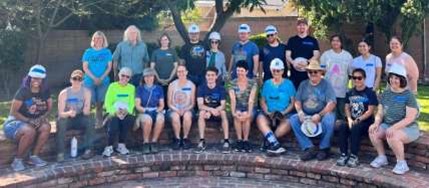 This was the first Habitat work day for most of the volunteers. We had 22 folks, and they were all excellent workers! They came from Claremont Presbyterian Church, Knox in Pasadena, Filipino Community United in Azusa, First Presbyterian Baldwin Park, Shepherd of the Valley, Interwoven, and New City Church Los Angeles. I’m so grateful for the great work parties from these churches! The volunteer from Interwoven New Worshiping Community actually went there for her first Sunday last week, and heard about the work day there, and so she came. (She also came back to Interwoven yesterday, because she loves it!) New City Church is in downtown LA, but they heard about the project from their lead pastor, our own Kevin Haah. The two volunteers, a mother and teenage daughter, took the bus from LA to do the work. Actually there were two mother-daughter teams, and everyone did great work. A very successful first day!
This was the first Habitat work day for most of the volunteers. We had 22 folks, and they were all excellent workers! They came from Claremont Presbyterian Church, Knox in Pasadena, Filipino Community United in Azusa, First Presbyterian Baldwin Park, Shepherd of the Valley, Interwoven, and New City Church Los Angeles. I’m so grateful for the great work parties from these churches! The volunteer from Interwoven New Worshiping Community actually went there for her first Sunday last week, and heard about the work day there, and so she came. (She also came back to Interwoven yesterday, because she loves it!) New City Church is in downtown LA, but they heard about the project from their lead pastor, our own Kevin Haah. The two volunteers, a mother and teenage daughter, took the bus from LA to do the work. Actually there were two mother-daughter teams, and everyone did great work. A very successful first day!
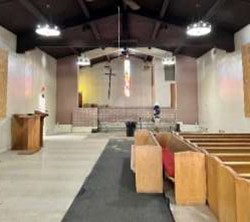 The first step towards the project, and the goal for Saturday, was clearing out the property. It was a bit of a shock to see that Habitat has been doing some advance work, so the sanctuary is now empty, with the pews moved to the side, and the stage in the fellowship hall has started to be torn down. But there were still many items, personal and furniture, that needed to be hauled out, and the property needed to be secured from intruders. Melinda Forbes has been working alone to find new homes for precious items such as the stained glass and the grand piano, and has cleared much of the property out herself.
The first step towards the project, and the goal for Saturday, was clearing out the property. It was a bit of a shock to see that Habitat has been doing some advance work, so the sanctuary is now empty, with the pews moved to the side, and the stage in the fellowship hall has started to be torn down. But there were still many items, personal and furniture, that needed to be hauled out, and the property needed to be secured from intruders. Melinda Forbes has been working alone to find new homes for precious items such as the stained glass and the grand piano, and has cleared much of the property out herself.
Thank God for her amazing dedication! It was bittersweet for her and Sonnie, I’m sure, to see the deconstruction, but they are also glad to see progress being made towards the longer- term vision. They told some of their story during lunch, and it moved folks to sign a card of thanks for them.
One of the Knox workers is a reserve Army chaplain, who has had 10 soldiers ask for Bibles in accessibly translations, so we gave her 30 Bibles from the church. Much of the furniture will be sent to Habitat’s ReStore stores, where people (including the general population) can purchase new and gently-used household goods.
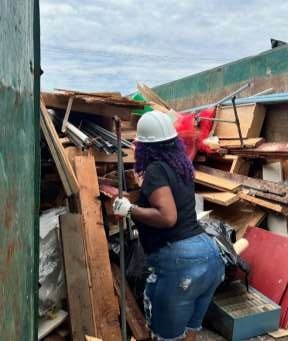 Don’t worry if you missed out on the day. There will be additional work days in the future. Now that we had the first one under our belt, I’m hoping we will have even more people come to future days. Even though it was hot and steamy (folks commented they couldn’t remember the last time they sweated so much), there was a great spirit, and it was gratifying to see how much work was done.
Don’t worry if you missed out on the day. There will be additional work days in the future. Now that we had the first one under our belt, I’m hoping we will have even more people come to future days. Even though it was hot and steamy (folks commented they couldn’t remember the last time they sweated so much), there was a great spirit, and it was gratifying to see how much work was done.
This was a great start for this project that will have significant impact on many families and the community of Baldwin Park. We prayed for the people who loved God and each other and the community for so many years as First Presbyterian Baldwin Park, and we are thankful that many of them have found a home at the Community Fellowship in West Covina. I am thrilled to see our new friends from Interwoven and New City Church, and the terrific support from our churches in Claremont, Azusa, Hacienda Heights, and Pasadena. And we can plan for future work days—and maybe even future property developments, with churches still worshiping in place—with better understanding of what it takes. What a great example of active stewardship, as we use these properties God has entrusted to us for the use of our congregations and the communities we serve.
Thanks to Habitat, to the people of Baldwin Park (the church and the community), and our volunteers and the churches that sent them. And most of all . . .
Thanks be to God!
Wendy

 At a shelter in Tijuana, one that receives “diverse families,” there was a poignant sign on a door: “You are safe here.” Can we become a refuge for so many people who have been knocked about by a loss of identity, and help them build back a new, positive self-identity as a beloved child of God?
At a shelter in Tijuana, one that receives “diverse families,” there was a poignant sign on a door: “You are safe here.” Can we become a refuge for so many people who have been knocked about by a loss of identity, and help them build back a new, positive self-identity as a beloved child of God?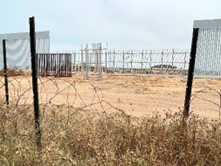 This trip was one of Wendy Gist’s accomplishments as Immigrant Accompaniment Organizer, as she planned the trip, secured funding, and worked closely with Via International to offer an extremely full and enlightening experience. Wendy has been doing what Presbyterian Disaster Assistance has always hoped when funding the Southern California presbyteries’ work with asylum seekers: to work together as SoCal Presbyterians, churches, and partners as we seek to advocate for and welcome people seeking security in the United States. This trip was one of the only voluntary projects that saw some form of participation from each of the seven Southern California presbyteries, and the Synod at large.
This trip was one of Wendy Gist’s accomplishments as Immigrant Accompaniment Organizer, as she planned the trip, secured funding, and worked closely with Via International to offer an extremely full and enlightening experience. Wendy has been doing what Presbyterian Disaster Assistance has always hoped when funding the Southern California presbyteries’ work with asylum seekers: to work together as SoCal Presbyterians, churches, and partners as we seek to advocate for and welcome people seeking security in the United States. This trip was one of the only voluntary projects that saw some form of participation from each of the seven Southern California presbyteries, and the Synod at large.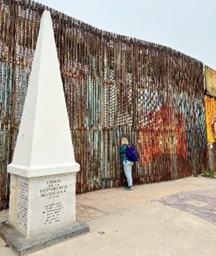 In five short days, we experienced crossing the border on foot, helped to tend Friendship Park (a community garden planted along the richly painted border wall near the coast), visited four different migrant shelters, met with several community leaders and people impacted by our broken immigration system, and received the amazing history of our Chicano neighbors at Chicano Park in San Diego. My respect for the people of Via International grew as they led the trip.
In five short days, we experienced crossing the border on foot, helped to tend Friendship Park (a community garden planted along the richly painted border wall near the coast), visited four different migrant shelters, met with several community leaders and people impacted by our broken immigration system, and received the amazing history of our Chicano neighbors at Chicano Park in San Diego. My respect for the people of Via International grew as they led the trip.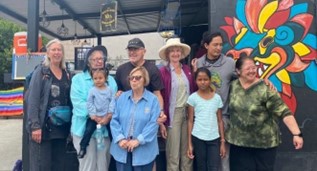 The shelters vary widely in approach and quality of life; one shelter did not seem to me to be habitable, another housed thousands of people but seemed to have sanitation facilities that should serve several dozen (still can’t figure that one out)—but is working with UC San Diego to build multiple ultramodern facilities! One remarkable shelter, Casa de Luz, has an amazing level of services for their 70 or so residents. They partner with the Border Church and Via International, and their leaders have a vision for beauty and the beauty of all people. The director was thrilled with the idea that we might be able to help them install a clean water system.
The shelters vary widely in approach and quality of life; one shelter did not seem to me to be habitable, another housed thousands of people but seemed to have sanitation facilities that should serve several dozen (still can’t figure that one out)—but is working with UC San Diego to build multiple ultramodern facilities! One remarkable shelter, Casa de Luz, has an amazing level of services for their 70 or so residents. They partner with the Border Church and Via International, and their leaders have a vision for beauty and the beauty of all people. The director was thrilled with the idea that we might be able to help them install a clean water system.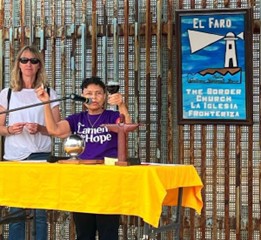 Violence in Palestine. The collapse of Haiti and Afghanistan. War in Ukraine. Gang violence and political instability in Latin America. There is much to mourn, and no easy answer. But I saw signs of hope, and perseverance, and faith, and a remarkable ability to work together for mutual survival. My prayer is that we put less faith in walls and condemnations, and more in God’s call for humility and compassion. May we treat others as God has treated us, and trust that God will continue to bless us, that we may be a blessing to others.
Violence in Palestine. The collapse of Haiti and Afghanistan. War in Ukraine. Gang violence and political instability in Latin America. There is much to mourn, and no easy answer. But I saw signs of hope, and perseverance, and faith, and a remarkable ability to work together for mutual survival. My prayer is that we put less faith in walls and condemnations, and more in God’s call for humility and compassion. May we treat others as God has treated us, and trust that God will continue to bless us, that we may be a blessing to others.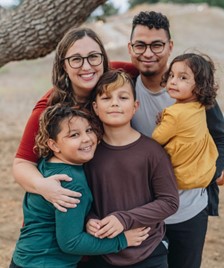 It was in that church that I began volunteering on the worship team, where I eventually met my husband Joshua. We were married in 2011 and worked at several non-denominational churches where he was hired as the worship leader, while I began my teaching career. When he wanted to make a career change as a barber and we were looking for a more diverse area to raise our family, we moved to Pasadena in 2017. Also wanting to find a more inclusive and progressive expression of Christian faith, we visited Knox Presbyterian Church our first week and immediately found a home in the community there – especially in the developing social justice teams for immigration, housing, eco-justice and racial justice, which are very much in line with our passions and where we find personal callings to advocacy work. We still attend Knox, along with our children Corban (10y), Judah (8y) and Eden (3.5y).
It was in that church that I began volunteering on the worship team, where I eventually met my husband Joshua. We were married in 2011 and worked at several non-denominational churches where he was hired as the worship leader, while I began my teaching career. When he wanted to make a career change as a barber and we were looking for a more diverse area to raise our family, we moved to Pasadena in 2017. Also wanting to find a more inclusive and progressive expression of Christian faith, we visited Knox Presbyterian Church our first week and immediately found a home in the community there – especially in the developing social justice teams for immigration, housing, eco-justice and racial justice, which are very much in line with our passions and where we find personal callings to advocacy work. We still attend Knox, along with our children Corban (10y), Judah (8y) and Eden (3.5y).